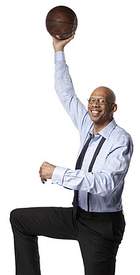“On the Shoulders of Giants,†a documentary based on a 2007 book written by NBA career scoring leader Kareem Abdul-Jabbar, has really been a lifelong passion project for the former Los Angeles Lakers great.
Growing up in New York, Abdul-Jabbar had known about the Harlem Rens, the first all-black teams that dominated the professional leagues in the 1920s and 30s.
In 1963, the team was inducted into the Naismith Memorial Basketball Hall of Fame.
 The Rens are the subject of “On the Shoulders of Giants,†a documentary released earlier this year. Abdul-Jabbar and director Deborah Morales will be at Cinemas Palme d’Or in Palm Desert for a screening April 30.
The Rens are the subject of “On the Shoulders of Giants,†a documentary released earlier this year. Abdul-Jabbar and director Deborah Morales will be at Cinemas Palme d’Or in Palm Desert for a screening April 30.
Abdul-Jabbar’s inspiration to tell this little-known story was due in part to meeting Dr. Martin Luther King as a child. Abdul-Jabbar was part of a summer work program, and he participated in the journalism workshop. The program was started by King, and Abdul-Jabbar got to cover one of his speeches.
“That changed my life,†said Abdul-Jabbar, who also co-wrote the movie. “It was something I wouldn’t forget and it had a profound effect on my life.
“From that point on, I wanted to be a historian and relate the truth of black Americans. The history books I had to deal with in the 1950s and 60s, black Americans were only mentioned in connection to slavery or civil rights, if mentioned at all. Something needs to be done with that, and it’s my motivation.â€
Abdul-Jabbar graduated from UCLA with a degree in history, and said if his NBA career didn’t pan out, he would have pursued writing historical books sooner.
One of Abdul-Jabbar’s assignments in the program was to learn about his community, which was Harlem.
“That’s when I found out the Rens were a great basketball team,†Abdul-Jabbar said. “I didn’t follow up on it. I didn’t know at that point, and this was 1964, that they were alive and I could have done some in-depth stuff with them. I was just aware of them.â€
In looking back, Abdul-Jabbar said former Rens star John Isaacs had watched him play in the schoolyards of New York. Another former player, Dolly King, had officiated a large number of his games at Power Memorial. And Abdul-Jabbar had gone to school with the daughter of Puggy Bell, another former Rens.
The Rens were short for the Harlem Renaissance, a hotel, casino and entertainment complex that the team was associated with.
Abdul-Jabbar said if he had not gone on to play in the NBA right after college, he would have pursued documenting the Rens. One person Abdul-Jabbar did interview was his former UCLA coach John Wooden, who had played against the Rens.
“He said the Rens played the best team game of any team he had ever seen,†Abdul-Jabbar said. “The way they played as a unit, their passing game, they were very well versed in practice.
“What he saw from them, it really had a profound effect on his coaching strategies later on.â€
However, finding people who knew much about the Rens was a challenge. There is not as much information about the Rens and their cultural impacts as say the Negro Leagues in comparison to Major League Baseball.
“In those days, basketball wasn’t considered a primary sport. It’s like what curling is today, an interesting minor sport,†Abdul-Jabbar said. “People photographed the Negro Leagues. Baseball was considered so important, that black Americans were considered worth the time to get on film. There was no such thing with basketball.
“No one went out of their way to record it or document it. The only thing is you can only read about it in books that didn’t have a lot of exposure. The story was just dying. I’m glad I breathed some life into it.â€
“On The Shoulder of Giants†premiered in February, and the response has been largely positive. Abdul-Jabbar said someone had said to him they thought the NBA should make the film mandatory for rookies to watch.
“Inevitably, when new people see the film, the initial comments I get is there’s so much that I didn’t know anything about. It’s something that slipped through the cracks of history. It makes me feel good that people are learning from it, especially high school kids.
“Someone said they should make every rookie watch the film. They need to know about the history of the league and how we got to this point here.â€
